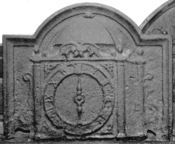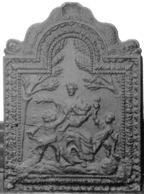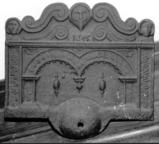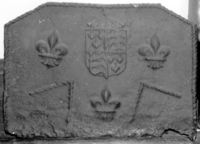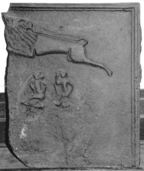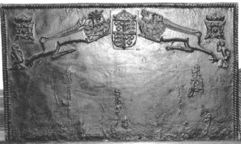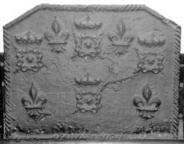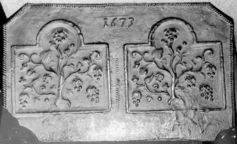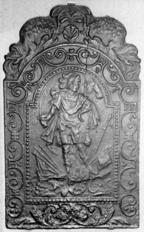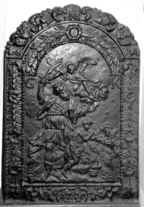-
119
Description: Arched rectangular shape; cavetto moulded edge on all sides; perspective view of a lantern clock.
Notes: The arms of the Worshipful Company of Clockmakers were granted in 1672: Sable a Clock each of the four pillars of the case based on a Lion couchant and capped with a Globe surmounted by a Cross and on the dome of the case an Imperial Crown all Or. The hands of the clock show six o’clock, as on the livery company shield. Formerly part of the Ade Collection (from Grove Hill, Hellingly, Sussex).
Copies of this fireback are known.
- Decoration tags:
- rectangular with round arch (shape)
- cavetto (edging)
- whole carved pattern
- objects
Manufactured: in the mid-17th century in the Weald area of England.
Current location: Hastings Museum and Art Gallery, John's Place, Bohemia Road, Hastings, East Sussex, England.
Museum number: HASMG: 1952.51.48 (LA 776) (part of the Hastings Museum museum group)
- Attached to series:
- Small cavetto series
- Livery company firebacks
-
138
Description: 'Dutch' style; arched rectangular shaped central panel with bead edging, figure of Charity holding a baby in her left arm and an olive branch in her right, two other children stand on each side of her, one holding a burning heart, trees in the background; arched rectangular shaped border with fillet edging and a repeated leaf pattern; on top a clam shell between two symmetrical serpents.
Notes: Typical type of fireback produced in Germany by Dutch pattern makers; the central panel was made separately for insertion into different borders; this border is a relatively simple type; the portrayal of Charity is derived from the 'Iconologia' of Cesare Ripa. Formerly part of the Ade Collection (from Grove Hill, Hellingly, Sussex).
Copies of this fireback are known.
- Decoration tags:
- 'Dutch' (shape)
- fillet (edging)
- carved pattern panels
- allegorical
- humans
- plants
Manufactured: in the mid- to late-17th century possibly in the Siegerland area of Germany.
Current location: Hastings Museum and Art Gallery, John's Place, Bohemia Road, Hastings, East Sussex, England.
Museum number: HASMG: 1952.51.40 (part of the Hastings Museum museum group)
Citation: Lloyd, N., 1925, 'Domestic Ironwork I', Architectural Review, 58, pp. 58-67.
- Attached to series:
- 'Dutch' Miscellaneous Firebacks
- Charity firebacks
-
123
Description: Rectangular; top panel with bearded face between symmetrical horizontal scrolls, and faces at either end; scrolls are repeated below, on either side of the date, all above a horizontal double fillet; below, a pair of arches with guilloche decoration between fillets, and toothed on the underside, are supported on each side by Tuscan columns, also with guilloche decoration; this is repeated in symmetrical rectangular panels on either side; at the centre base a bulbous nozzle protrudes.
Notes: This is a smith's forge fireback, the nozzle being the tuyere directing the air into the fire from bellows behind. Stylistically similar to the Lenard and other firebacks of the same period, the carved elements above the nozzle may have been cast from a pattern inspired by the back of a joined 'wainscot' chair, with the date inserted. The back may have been used for forging non-ferrous metals as there was a trade in pot-founding in bronze as well as iron at some ironworks in the Weald. Formerly part of the Ade Collection (from Grove Hill, Hellingly, Sussex).
Inscription: 1655
- Decoration tags:
- rectangular with round arch (shape)
- fillet (edging)
- whole carved pattern
- individual numbers
- architectural
- text
- humans
Manufactured: in 1655 in the Weald area of England.
Current location: Hastings Museum and Art Gallery, John's Place, Bohemia Road, Hastings, East Sussex, England.
Museum number: HASMG: 1952.51.62 (part of the Hastings Museum museum group)
Citation: Butterfield, W. R., 1916, 'Old Wealden Firebacks', The Connoisseur, 46, pp. 197-209.
- Attached to series:
- Chair pattern firebacks
- Furniture stamp firebacks
-
124
Description: Canted rectangle; twisted rope edging (top and sides); top centre, crowned Tudor royal shield; fleur de lys on each side and below; slanting, inverted 'V' of twisted rope on each side of lower fleur.
Notes: One of a large series of firebacks incorporating Tudor heraldic stamps; the 'V' shapes may have apotropaic significance.
Arms: Tudor royal arms of England
- Decoration tags:
- rectangular with canted top corners (shape)
- rope (edging)
- simple stamps
- carved stamps
- heraldic
- apotropaic
- armorial
- objects
Manufactured: in the mid-16th century in the Weald area of England.
Current location: Hastings Museum and Art Gallery, John's Place, Bohemia Road, Hastings, East Sussex, England.
Museum number: HASMG: 1904.32 (part of the Hastings Museum museum group)
- Attached to series:
- Royal series
- Fleur-de-lys firebacks
-
126
Description: Fragment; rectangular; astragal and fillet edging (top and sides); oblique lion passant above two left facing 'imps', one with right arm raised, the other with both arms lowered.
Notes: One of the legs of the leopard is missing, suggesting that the stamp, which appears complete on many firebacks, was well used and had been damaged; this suggests a relatively late use of this stamp.One of a large series all bearing royal heraldic stamps, but unusual in the use of moulded edging, twisted rope being normally used for this series. The surviving elements were probably mirrored on the missing half. Formerly part of the Ade Collection (from Grove Hill, Hellingly, Sussex).
- Decoration tags:
- rectangular (shape)
- astragal & fillet (edging)
- carved stamps
- heraldic
- animals
- humans
Manufactured: in the mid- to late-16th century in the Weald area of England.
Current location: Hastings Museum and Art Gallery, John's Place, Bohemia Road, Hastings, East Sussex, England.
Museum number: HASMG: 1952.51.12 (LA 760) (part of the Hastings Museum museum group)
- Attached to series:
- Royal series
-
127
Description: Rectangular; twisted rope edging (top and sides); top centre, crowned Tudor royal shield between a lion passant on the right and a lion passant guardant sinister on the left; in each top corner a crowned four-petal rose, below which, to the right, a left-facing 'imp' with right arm raised, and to the left, a left-facing 'imp' with both arms lowered.
Notes: One of a large series bearing heraldic stamps.
Arms: Tudor royal arms of England
- Decoration tags:
- rectangular (shape)
- rope (edging)
- carved stamps
- heraldic
- armorial
- animals
- humans
Manufactured: in the mid-16th century in the Weald area of England.
Current location: Hastings Museum and Art Gallery, John's Place, Bohemia Road, Hastings, East Sussex, England.
Museum number: HASMG: 1925.3 (part of the Hastings Museum museum group)
- Attached to series:
- Royal series
-
128
Description: Canted rectangle; twisted rope edging (top and sides), with dowel across the top corners; symmetrical arrangement of four crowned four-petal roses, top centre, bottom centre and both top corners; symmetrical arrangement of four fleurs de lys, two either side of top central rose, two in bottom corners.
Notes: One of a large series bearing heraldic stamps. Given to Hastings Museum by Mr A. E. Anderson of Brightling Hall, Robertsbridge, Sussex.
- Decoration tags:
- rectangular with canted top corners (shape)
- rope (edging)
- carved stamps
- heraldic
Manufactured: in the mid-16th century in the Weald area of England.
Current location: Hastings Museum and Art Gallery, John's Place, Bohemia Road, Hastings, East Sussex, England.
Museum number: HASMG: 1914.64.1 (part of the Hastings Museum museum group)
Citation: Butterfield, W. R., 16 Feb 1935, 'A Tudor Fireback', Hastings and St Leonards Observer.
Citation: Baines, J. M., 1958, Wealden Firebacks (Hastings Museum).
- Attached to series:
- Royal series
-
129
Description: Canted rectangle; twisted rope edging (top and sides); date stamp top centre; arched rectangular style fireback with cavetto-moulded edge and fructed ‘vine’ plant design, impressed twice; vertical twisted rope length between. Damage to bottom corners.
Notes: A composite fireback using the impressions of another fireback repeated for a symmetrical design. Formerly part of the Ade Collection (from Grove Hill, Hellingly, Sussex).
Inscription: 1673
- Decoration tags:
- rectangular with canted top corners (shape)
- rope (edging)
- composite
- date stamp
- text
- plants
- objects
Manufactured: in 1673 in the Weald area of England.
Current location: Hastings Museum and Art Gallery, John's Place, Bohemia Road, Hastings, East Sussex, England.
Museum number: HASMG: 1952.51.65 (part of the Hastings Museum museum group)
- Attached to series:
- Composite firebacks
- Small cavetto series
-
130
Description: Arched rectangular shaped central panel with bead on fillet edging; helmeted figure of Mars holding a cutlass in his right hand, standing on a field of flags, spears and cannon; 'Palladian' shaped border with fillet edging enclosing a repeated scrollwork pattern with floral arrangement at base; on top, symmetrical arrangement of scallop shell between two sea serpents and plant fronds.
Notes: Although in the 'Dutch'; style, an absence of this type in continental collections suggests an British source. Formerly part of the Ade Collection (from Grove Hill, Hellingly, Sussex).
Copies of this fireback are known.
- Decoration tags:
- 'Dutch' (shape)
- fillet (edging)
- whole carved pattern
- mythological
- humans
Manufactured: in the late-17th to early-18th century in England.
Current location: Hastings Museum and Art Gallery, John's Place, Bohemia Road, Hastings, East Sussex, England.
Museum number: HASMG: 1952.51.32 (part of the Hastings Museum museum group)
- Attached to series:
- British 'Dutch' style firebacks
-
139
Description: Arched rectangular shaped central panel with bead-and-pellet edging; figure of Abraham, a scimitar in his raised right hand, which is being restrained by an angel emerging from a cloud; Isaac is kneeling to Abraham's left and a ram is caught in a bush to the left of the plate; the initials are in the top corners; arched rectangular shaped border with fillet edging, and swags of leaves suspended from flowers; on top, symmetrical foliate swirls.
Notes: The design is an adaptation of an engraving by Adriaen Collaert (1555-1623) of a painting by Maarten de Vos (1532-1603), Plate 5 of The Story of Abraham. In the 'Thesaurus sacrarum historiarum veteris testamenti', published in Antwerp by Gerard de Jode (1509-1591) in 1579, 1585 and, subsequently, by Visscher in 1589. One of a small group of firebacks, all of similar shape, some with biblical designs, others mythological, all dated around 1700 and bearing the letters GK. Formerly part of the Ade Collection (from Grove Hill, Hellingly, Sussex).
Copies of this fireback are known.
Inscription: G K / 1700
- Decoration tags:
- 'Dutch' (shape)
- fillet (edging)
- whole carved pattern
- individual letters
- biblical
- text
- humans
Manufactured: in 1700 in the Siegerland area of Germany.
Current location: Hastings Museum and Art Gallery, John's Place, Bohemia Road, Hastings, East Sussex, England.
Museum number: HASMG: 1952.51.37 (part of the Hastings Museum museum group)
Citation: Lloyd, N., 1925, 'Domestic Ironwork I', Architectural Review, 58, pp. 58-67.
- Attached to series:
- 'Dutch' GK series
- Old Testament & Apocrypha firebacks
- Abraham & Isaac firebacks
